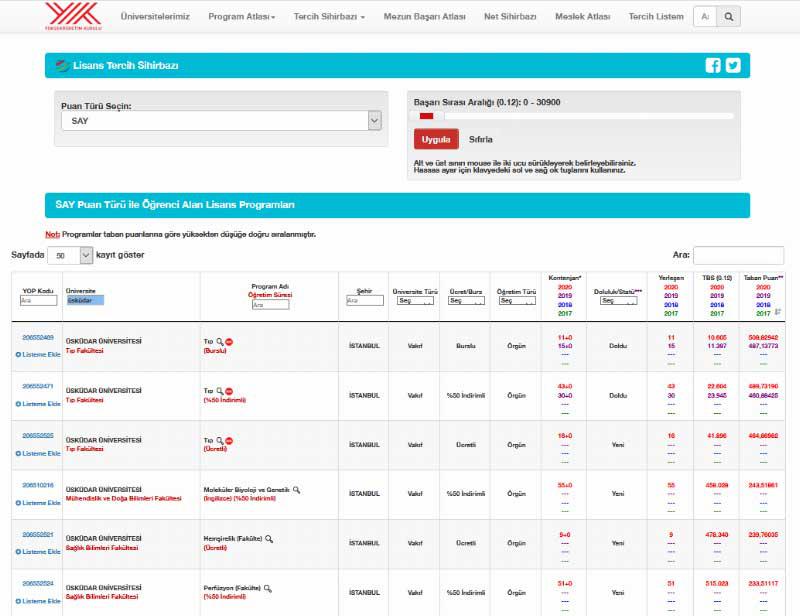
Navigating the Legal Landscape: A Comprehensive Guide to YÖK Atlas Hukuk Rankings 2025
The legal profession is a challenging and rewarding field, demanding dedication, analytical skills, and a deep understanding of the law. Choosing the right university program can be a pivotal step in embarking on this journey. The YÖK Atlas, a comprehensive database maintained by the Council of Higher Education (YÖK) in Turkey, provides a valuable tool for prospective law students by ranking universities based on various criteria. This article will delve into the intricacies of the YÖK Atlas Hukuk rankings for 2025, offering insights into the methodology, key factors, and how to interpret the data.
Understanding the YÖK Atlas: A Framework for Evaluation
The YÖK Atlas is designed to provide a standardized and transparent platform for evaluating Turkish universities. It encompasses a wide range of indicators, including:
- Academic Performance: This category assesses the quality of education offered by the university, considering factors like faculty qualifications, research output, and student success rates.
- Infrastructure and Resources: This category evaluates the university’s physical facilities, library resources, technological infrastructure, and overall learning environment.
- Internationalization: This category measures the university’s engagement with the global academic community, including international collaborations, student exchange programs, and foreign language instruction.
- Social Impact: This category assesses the university’s contribution to society, encompassing factors like community outreach programs, alumni engagement, and societal relevance of research.
Hukuk Rankings: A Focus on Legal Education
Within the YÖK Atlas, the Hukuk (Law) rankings specifically evaluate law faculties across the country. This analysis considers factors crucial to legal education, such as:
- Faculty Expertise: The quality of faculty is paramount in legal education. The YÖK Atlas considers factors like faculty members’ academic qualifications, research publications, and teaching experience.
- Curriculum and Pedagogy: The law curriculum should be comprehensive, rigorous, and relevant to the contemporary legal landscape. The YÖK Atlas assesses the curriculum’s depth, breadth, and alignment with industry needs.
- Clinical Legal Education: Practical experience is essential for aspiring lawyers. The YÖK Atlas evaluates the availability and quality of clinical legal education programs, which provide students with hands-on experience in real-world legal settings.
- Moot Court Competitions and Legal Clinics: Participation in moot court competitions and legal clinics demonstrates students’ ability to apply legal knowledge and develop critical thinking skills. The YÖK Atlas considers these activities as indicators of student engagement and professional development.
- Research Output and Impact: Legal research plays a vital role in shaping legal discourse and influencing policy decisions. The YÖK Atlas assesses the quality and impact of research produced by law faculty members.
Interpreting the YÖK Atlas Hukuk Rankings
The YÖK Atlas Hukuk rankings are not a definitive measure of the quality of legal education. They are a valuable tool for providing a comparative overview of universities based on specific criteria. However, prospective students should consider the following:
- Rankings are not static: Rankings can fluctuate from year to year based on various factors, including changes in faculty composition, curriculum revisions, and research output.
- Individual priorities matter: Different students have different priorities. Some may prioritize research opportunities, while others may prefer a strong clinical legal education program.
- Beyond the rankings: Prospective students should go beyond the rankings and conduct thorough research on individual universities. This includes visiting the university website, attending open days, and speaking to current students and faculty members.
Navigating the Rankings: A Step-by-Step Guide
To effectively utilize the YÖK Atlas Hukuk rankings, prospective students should follow these steps:
- Access the YÖK Atlas website: Visit the official YÖK Atlas website and navigate to the Hukuk rankings section.
- Familiarize yourself with the methodology: Understand the criteria used to generate the rankings and the weight assigned to each factor.
- Explore the rankings: Review the top-ranked universities and analyze the factors contributing to their high scores.
- Consider your individual priorities: Identify your priorities in legal education and filter the rankings accordingly.
- Conduct further research: Once you have identified potential universities, conduct in-depth research on their specific programs, faculty expertise, and student support services.
- Visit the universities: If possible, visit the universities you are considering to experience the campus environment and interact with faculty and current students.
The Importance of Holistic Evaluation
The YÖK Atlas Hukuk rankings provide a valuable framework for evaluating law schools, but they should not be the sole factor in making a decision. Prospective students should consider other factors, such as:
- Faculty expertise and research interests: Align your interests with the expertise of faculty members at the university.
- Career services and alumni network: Explore the university’s career services and alumni network to understand their support for career development.
- Location and cost of living: Consider the location of the university and the cost of living in the surrounding area.
- Student life and campus culture: Evaluate the student life and campus culture to ensure a supportive and enriching environment.
Conclusion: Making Informed Decisions
The YÖK Atlas Hukuk rankings provide a valuable resource for prospective law students in Turkey. By understanding the methodology, key factors, and how to interpret the data, students can make informed decisions about their legal education. Remember, the rankings are just one piece of the puzzle. Conduct thorough research, consider your individual priorities, and engage with universities to make the best choice for your future legal career.







